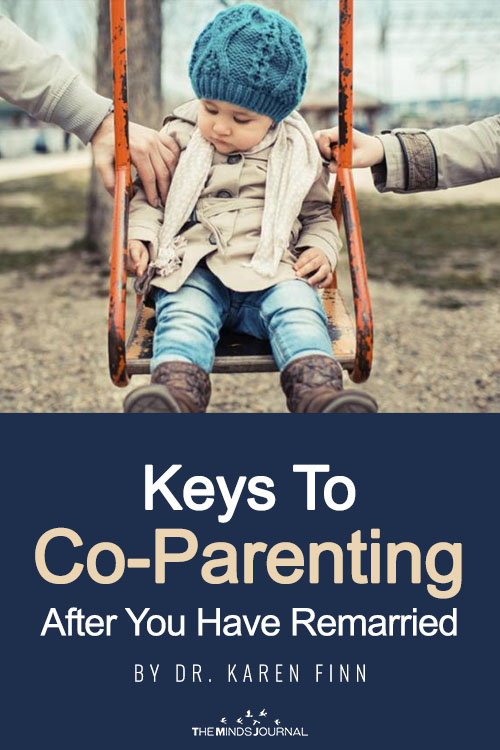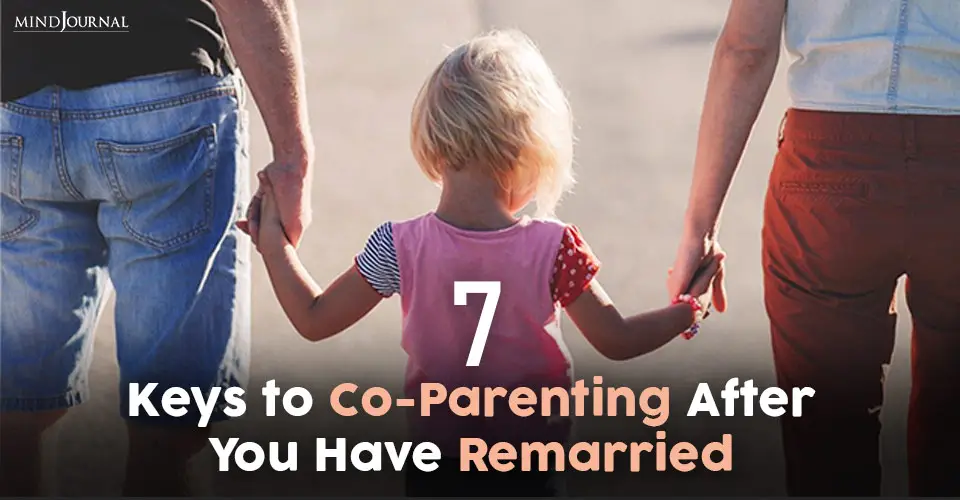Co-parenting after getting remarried can be a unique challenge especially if you share a testy relationship with your ex. Things can get even harder once another new partner enters the scene and tries to raise your child as their own. For the well being of your child, you need to try to create a cordial and workable relationship with your ex-spouse and their partner.
Divorce can make life feel unraveled on countless levels. And no one in its sphere is immune to its effects. If you have children and are co-parenting, you know there will be new adjustments as you begin to open your life to new love. And if you plan to remarry, you will need keys to co-parenting that support your children and allow you to move on with your life.
Research shows that children of divorce who spend at least 35% of their time with each parent have better relationships with both parents. They also fare better academically, socially, and psychologically.
The takeaway here is that shared parenting, or co-parenting, should be the goal of divorced parents committed to their children’s highest good. (However, co-parenting isn’t always possible and sometimes it isn’t in the best interest of the children.)
Successfully using the keys to co-parenting requires the commitment of the parents to behave like adults. Their primary focus can’t be on their personal squabbles or lingering anger from their marriage.
And if the biological parents can’t co-parent in a healthy way, adding a new spouse to the mix won’t make things any easier.
Related: 9 Tips For Co-Parenting With Your Difficult Ex
Briefly, here is a review of the important keys to co-parenting in a healthy way. This is what you want your relationship to look like on behalf of your children.
1. Clear boundaries. You don’t try to control one another or interfere in matters that don’t involve your children’s welfare.
2. Open communication – Talking, email, text, etc.
3. Consistency with the rules in both households. Granted, you’re not going to have identical homes and styles. But your children know that “homework before TV” means the same thing at Dad’s as it does at Mom’s.
4. A predetermined, predictable schedule. And any changes are discussed with one another before being discussed with the kids.
5. Willingness to be flexible. Life happens, and everyone needs some give now and then.
6. Never speaking disrespectfully of the other, at least not in front of your children. You recognize the significance of the other parent in your children’s lives, and you keep your adult issues out of their earshot.
7. Amicability during social events where both you and your ex are present. This becomes especially important when one or both of you begin dating other people and including them in your children’s lives.
Before discussing the keys to co-parenting after you have remarried, it’s worth pausing to look at what a child experiences when a parent remarries. By stepping into your child’s shoes, you will intuitively navigate your co-parenting arrangement more compassionately and successfully.
This Is How Your Child Feels When You Remarry
1) A sense of loss.
The child realizes that he will never have his original family back. He may even feel he is losing the parent who is remarrying. He may even feel jealousy toward the new stepparent and stepsiblings.
Recognize that your child may feel like an outsider in his own home, and be prepared to reassure him of his essential place.
2) Confused feelings.
Underlying the keys to co-parenting after remarrying are the natural, perplexing feelings of the child who feels lost in the new dynamics.
Expect that your child will be insecure about how to accept the new stepparent and still respect her “replaced” parent. She will naturally make comparisons between the two.
She may also have loyalty struggles, especially if you have unresolved issues with your ex. This is why it is so important that parents never fight “through” their kids.
Related: 7 Ways To Help Your Child Cope-Up With Your Divorce
3) Adjusting to new rules and relationships.
Anytime someone new enters an established relationship, there are changes in routines and rules. A child may feel resentment toward a new authority figure. He may also long for privacy that becomes more difficult to find with new family members around.
Younger children tend to adapt to new relationships more quickly than older children. By studying and considering your child’s developmental stage, you can better anticipate emotional and behavioral responses to divorce and remarriage.
Welcoming love into your life can be a wonderful, triumphant experience after all the work of healing from a divorce. But the addition of that extra helping hand inevitably makes parenting and co-parenting more complex. Even the best circumstances will have challenges.
It’s important, then, that all the involved adults follow these keys to co-parenting. You’ll notice that they are a blend of all the above points – healthy co-parenting and compassion for each child’s emotional response to your remarriage.
7 Keys To Co-Parenting After You Have Remarried
1) Healthy boundaries for the stepparent.
It can be really difficult to have a new spouse who has to take a back seat of sorts to the major decisions of childrearing. But it’s essential that you protect your co-parenting relationship with your children’s other biological parent.
All the major decisions and important discussions about your children’s upbringing belong to you and your ex. This will require a delicate balance, as your new spouse will be living with your children and will inevitably play a central role in their day-to-day lives.
It’s important that s/he not simply assume a parental role, but respect the roles of the biological parents. And the biological parents should respectfully ease the new stepparent into co-parenting roles.
2) Open communication — among everyone.
You will have to retain your co-parenting communication with your ex. You will also have to bring your new spouse into that dynamic so that all the “parents” are on the same page for your children’s welfare.
Yes, the major decisions belong to the biological parents. But everyone is involved in raising and loving the children. And your new marriage also deserves respect and transparency.
3) Non-negotiable respect.
No matter what you or your new spouse think about your ex or former marriage, you must never express disrespect in front of the children. This is especially true for the new stepparent.
Likewise, your ex should never speak disparagingly of your new spouse in front of the children.
Related: Having Trouble Co-Parenting with Your Difficult Ex? Things To Know
4) Naming the stepparent.
Going back to the experiences of a child when a parent remarries, the new stepparent represents confusion in loyalty. Encouraging children to call a stepparent “Mom” or “Dad” just adds to that confusion.
It is also inappropriate and will anger and hurt your co-parent. In most cases, using the stepparent’s first name is the safest, most natural approach for children.
5) Setting everyone up to succeed.
The key to co-parenting after remarriage is to not disregard the new spouse. S/he is going to be involved in the day-to-day lives of everyone in your home (including any kids s/he may have brought to the marriage).
Find out what your new spouse is willing and able to do with regard to parenting. Give him/her room to include each child in activities they both enjoy and can share.
What role does your spouse want to play? And how can you support that role while protecting the integrity of your co-parenting relationship? By allowing your new spouse to be another source of love and support for your kids, everyone will adjust with less fear and confusion.
6) Talking about feelings.
Again, depending on where your children are age-wise, they are probably going to experience an array of feelings. Everything from abandonment to guilt to anger is likely to show up.
Be open and honest with your kids about their feelings, and be willing to get professional help if necessary. Everyone should feel heard and validated.
And children need to know that their feelings are a natural response to such enormous changes in their lives. They also need to know that all of their parents have their best interests at heart.
7) Remembering your focus.
It’s bound to happen – your ex is going to say or do something that makes your blood boil. Or you’re going to disagree on a major decision. You will be stuck trying to co-parent with no apparent “co” on board.
In these derailing moments, there is only one question that matters:
Is this about me or my kids?
Related: 15 Things You Can Do When Co-Parenting With A Psychopath
The addition of a stepparent to a child’s life can be wonderful or miserable. Despite a child’s natural feelings and behavioral changes during the adaptation, a stepparent can represent a huge bonus. Extra love. Extra attention. Extra support.
How this new dynamic plays out depends, in large part, on how you protect the integrity of your co-parenting relationship with your ex.
The essential keys to co-parenting after you have remarried echo the essential keys to co-parenting before you remarried. Respect everyone involved. Behave like mature, responsible adults. Communicate. And, above all, prioritize your children.
Written by Dr. Karen Finn Originally appeared in drkarenfinn.com










Leave a Reply
You must be logged in to post a comment.